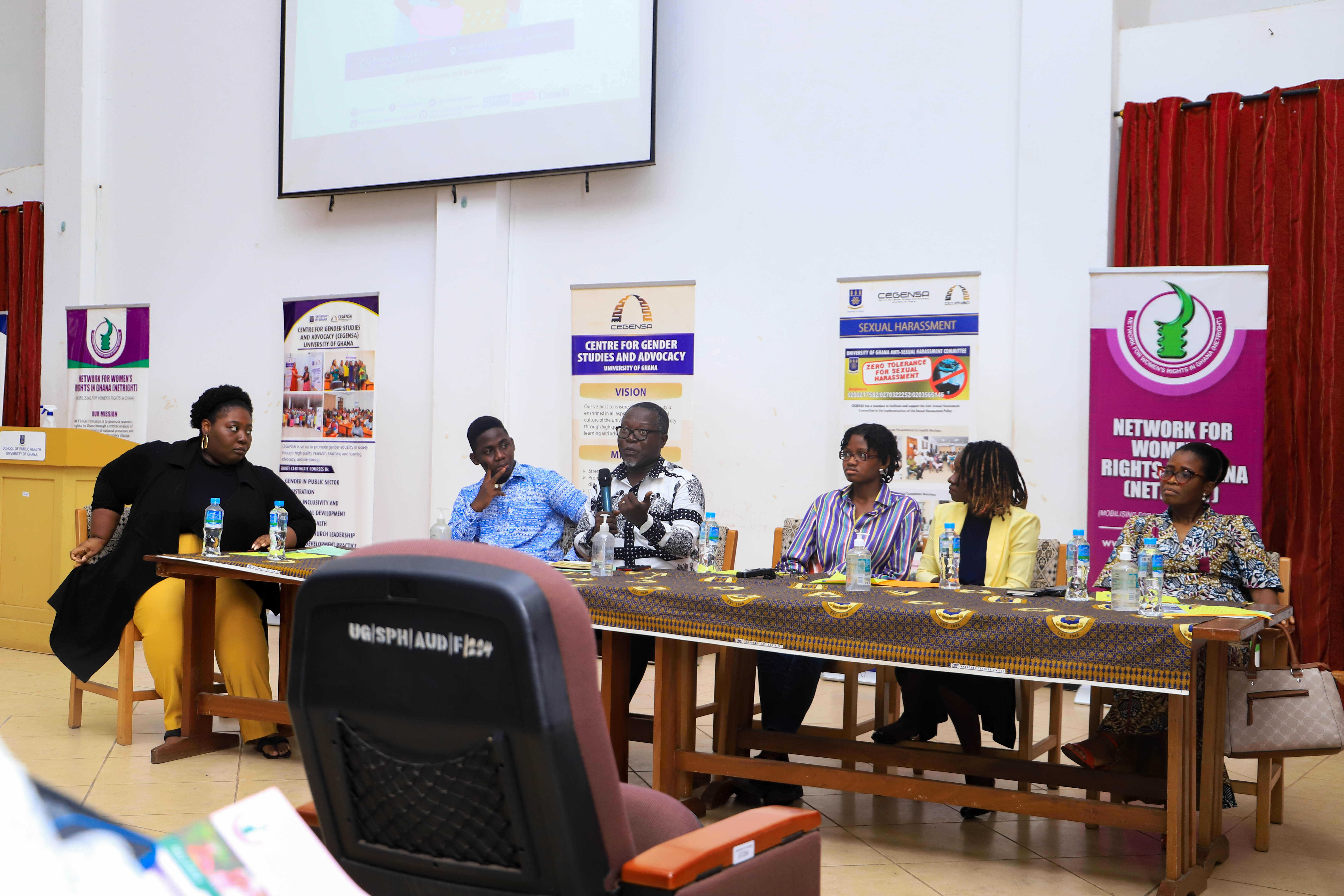Sensitization Programme for Students of University of Ghana
The Centre for Gender Studies and Advocacy (CEGENSA) in collaboration with Network for Women’s Right in Ghana (NETRIGHT- Ghana) organised a programme with the theme “Creating a Gender Equitable University Community: The Perspective of Students” to sensitize young adults, specifically students of University of Ghana. This was to empower participants to ensure equity among all students. The programme was in the form of a panel discussion and interactive session with students.
The participants were mostly undergraduate students with a few MPhil and doctoral students. A few faculty members were also present at the programme. The panellists on the other hand included Dr. Abena Kyere, a Research Fellow at CEGENSA; Dr. Adolf Awuku Bekoe, a Clinical Psychologist & Gender Based Violence vulnerability specialist; Ms. Beatrice Akomah Boamah, the Secretary General of the Graduate Students’ Association of Ghana (GRASAG), Ms. Ono-Oritsebawo Anna Marie Oyan, Student of Engineering; and Mr. Graham Oduro Derry, Students’ Representative Council (SRC) Project Lead.
The programme was chaired by Ms. Eugenia Selassie Seadey, GRASAG Women’s Commissioner, University of Ghana and the Master of Ceremony (MC) for the day was Ms. Maame Adwoa Amoa-Marfo, a student of University of Ghana.

Dr. Atobrah delivering the welcome address
In her welcome address, Dr. Deborah Atobrah, Director of CEGENSA indicated among other things, that it was important to listen to the perspectives of students because even though they formed the larger population of stakeholders, they were at the bottom of the hierarchy making them easily vulnerable. She added that the forum was equally important because it provided a platform for communication to address certain misconceptions about what gender policies sought to do.
On her part, Ms Patricia Blankson Akakpo, Director of NETRIGHT-Ghana, stated that NETRIGHT-Ghana was on a quest to strengthen young women’s agency and provide safe spaces for them to identify their “power within”, discuss their issues, interrogate policies and set their own agenda to effect change.
Ms. Eugenia Selasie Seadey, chair of the occasion, expressed her appreciation to the Director of CEGENSA for the invitation to chair the programme. She indicated that gender equity was not merely a “buzzword” but an essential principle that should permeate every aspect of society. She commended the University of Ghana for the tremendous efforts made in fostering a gender equitable environment over the past years which has led to outstanding females occupying top management positions at the University. She noted that although much has been done to promote gender equity in the University, the work is far from complete since there are still barriers and challenges that need to be addressed. She believed that as students, their perspectives were invaluable in identifying areas where inclusivity and gender equity could be enhanced.

Ms. Cythia Sunu, Senior Programme Officer at NETRIGHT gave a presentation on Mobilizing for Women’s Rights; the Role of NETRIGHT. After her presentation, a sketch was performed by the School of Performing Arts.
The panellists in various ways explained that gender-related matters were not over recognition of the role of women over men but rather an effort to reduce the historical domination of men over women which has contributed to the distribution of power.
They called for an end to some discriminatory comments on the part of lectures towards particularly female students as it had the potential to affect their core self-esteem and subsequently their academic performances. They indicated that there was the need for increased awareness creation about the University of Ghana Gender Policy to better protect all students. They also urged the students not to hesitate in reporting sexual harassments or discriminatory practices against them.
After the panel discussion, participants were given the opportunity to ask questions and make contributions as well.
In her closing remarks, the chair stated that the programme has revealed to all that a gender equitable university should be one which guarantees equality and fairness in access to education through the admission process for all gender regardless of the established traditional norms. She summarised the information gained from the discussions and urged her fellow students to be agents of change. She also suggested that CEGENSA should consider publishing and sharing the outcome of the discussions at the forum with the various departments in the university.
The programme was well attended and very successful. Although the programme was planned for two hundred and fifty (250) students, two hundred and ninety-two (292) undergraduate students registered and attended the programme aside the MPhil students, doctoral students and faculty who participated.
CEGENSA is very grateful to NETRIGHT-Ghana for the partnership and sponsorship they gave for such a successful programme.

